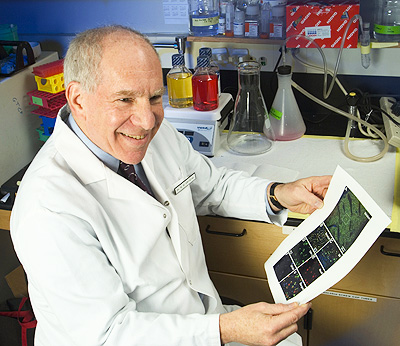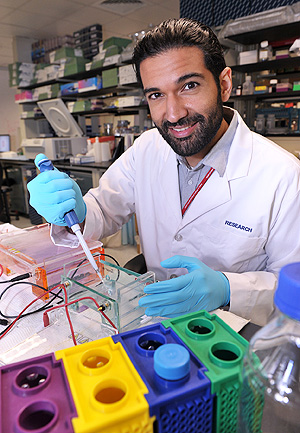Mapping the Qatari genome to prevent inherited diseases
January, 2014

Dr. Ron Crystal, chairman of genetic medicine at WCMC-NY,
is leading a group of research projects investigating the
Qatari genome
A Weill Cornell Medical College study that analyzed the DNA of Qatar’s native population has discovered genetic variations that could help doctors target interventions to reduce the prevalence of a variety of debilitating hereditary disorders.
Researchers at WCMC-Q and Weill Cornell Medical College New York (WCMC-NY), working with colleagues from Cornell University in Ithaca and Hamad Medical Corporation, identified 37 genetic variants in 33 genes known to play causal roles in a total of 36 diseases, including such devastating conditions as cystic fibrosis, sickle cell anemia and muscular dystrophy. The study points the way to more comprehensive screening for a host of inherited diseases, which could significantly reduce their incidence.
The project, entitled Exome Sequencing Identifies Potential Risks Variants for Mendelian Disorders at High Prevalence in Qatar, sequenced the DNA of 100 Qatari nationals representing the three major ethnic subgroups of the country – the Bedouin (termed Q1 for the purposes of the study), those of Persian-South Asian descent (Q2), and those of African descent (Q3). By analyzing the individuals’ exomes – important sections of the DNA containing the code that is translated into proteins – and comparing them to the genetic data of the participants in the worldwide 1000 Genomes Project (1000G), the researchers were able to identify the variations that cause disease among the Qatari population.
All of the conditions targeted in the study were so-called ‘Mendelian diseases’. Named for Gregor Mendel, the 19th century researcher widely regarded as the founder of genetic science, Mendelian diseases are those caused by a single mutated gene and are also known as monogenic disorders.
Dr. Khalid Fakhro, postdoctoral associate in genetic medicine at WCMC-Q, and Dr. Juan L. Rodriguez-Flores of WCMC-NY, were co-lead principal investigators on the study, which is part of a group of research projects investigating the Qatari genome led by Dr. Ronald Crystal, chairman of genetic medicine at WCMC-NY. The study was accepted for publication in the journal Human Mutation, appearing online in December 2013 and in print in January 2014.
Dr. Crystal explained the study: “There are about 3.2 billion letters that comprise the human genome and about two percent of those letters code for the actual proteins. This two percent is found in regions called exomes,” he said. “A Mendelian or monogenic disease is caused by a change in a single letter out of the 3.2 billion.
"The reason this is relevant for Qatar is that the structure of the society encourages a high degree of consanguineous marriage, so the frequency of these monogenic diseases is quite high."
Pre-marital counseling and screening is one method of decreasing the likelihood of children being born with monogenic diseases. Parents undergo screening to see if either or both carry genetic variations that cause disease before having children. The individuals that carry the disorder do not necessarily have the conditions themselves, but may carry them on recessive genes.
Dr. Crystal said: "Disorders are present in all populations around the world, so it’s not the case that Qatar is different. Qatar is only different in that its variations and the frequency with which they occur are unique to its population. By finding out what these variations are and taking appropriate action we can save people from the trauma of some very unpleasant disorders. We’re talking here about things like brain malformation, diabetes, blindness, deafness, cardiovascular disorders, inflammatory disorders and many other conditions. While these conditions are not common, they do occur, some are untreatable and many are very difficult to live with, for both the sufferer and their families."
Currently, pre-marital counseling in Qatar screens for four genetic variations out of the 37 identified by the study, so incorporating the newly discovered variations into the screening process could have a significant impact.

Dr. Khalid Fakhro, postdoctoral associate in genetic
medicine at WCMC-Q, was a co-lead principal
investigator on the study
Dr. Crystal explained the possible practical applications of the study.
"With more comprehensive screening, people will be able to make more informed choices about whether they feel it’s safe to have children together.
"Alternatively, it is possible to screen the fertilized eggs for variations that cause disorders before they are implanted.
"The improved screening can also be useful for adults who can change their lifestyle to prevent themselves from developing diseases. For example, if I analyze your DNA and tell you you’re susceptible to having elevated accumulation of lipids – cholesterol and triglycerides that can cause cardiovascular disease – then you could alter your diet and take care to take plenty of exercise to mitigate the risk."
The scale and scope of the group of studies has been made possible by the new generation of advanced technologies that allow researchers to analyze vast amounts of genetic data. WCMC-Q has a well-established state-of-the-art genomics research laboratory under the stewardship of Dr. Joel Malek, assistant professor of genetic medicine and director of genomics, which affiliated researchers can draw upon.
Dr. Crystal said: "Qatar is ahead of the game in this regard as all of the cutting-edge genomics technology is in Dr. Joel Malek’s state-of-the-art laboratory. It really is a quantum leap in technology as previously we could only look at one abnormality at a time and it was very time-consuming. Now we can look at all of the abnormalities at once and the process is vastly quicker and more efficient."
Dr. Fakhro explained how research at WCMC-Q is paving the way for a new era of genetics research in the region. He said: “The 1000 Genome Project is the biggest open-source resource in the world and, despite the name, the project has actually sequenced the genomes of more about 2,500 individuals. However, the representation from people from the Arab world in the project is virtually zero, which of course inhibits researchers in the field of genetics when they focus on the Gulf region.
"At WCMC-Q we are working to develop our own database of genomes relevant to the region. We have already sequenced 100 full genomes and we have a project running to sequence the exomes of 1,000 individuals. Both of these databases will give genetic research in our region a huge boost."
In a fortuitous twist, the mapping and analysis of Qatari genomes has provided unexpected insight into a genetic variation that affects African-derived populations all over the world. In a separate study, led by Dr. Crystal, researchers focused on a variation of a gene called ApoE that makes carriers disproportionally susceptible to having increased levels of unhealthy fats called triglycerides in their blood, which is associated with disorders such as heart disease, type 2 diabetes and stroke. The ApoE variant, termed R145C, was previously considered extremely rare, but Dr. Crystal’s study found that the mutation is far more common than was realized and that it disproportionally affects people of sub-Saharan African extraction.
The study, reported in the American Journal of Cardiology, compared the genomes of Qatar’s sub-Saharan African subgroup with the Persian-South Asian group and the Bedouin by analyzing 228 individuals. The investigators found that 17 percent of the African-derived subgroup had the R145C variant, while none of the Bedouin or Persian participants had the mutation. The research team then examined the 1000G data and found that the R145C variant is virtually non-existent among populations of non-African descent but is found in between five and 12 percent of African-derived populations. A study of 1,266 African-Americans in the New York area found that four percent carried the R145C variant.
Dr. Crystal said: “These findings have important implications for African and African-derived populations all over the world, including in the United States.
"From a Weill Cornell point of view, it was extremely gratifying for us to make a discovery in Qatar that provided insight into the health of people in New York, where our home campus is."
